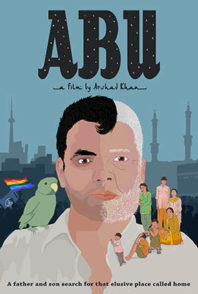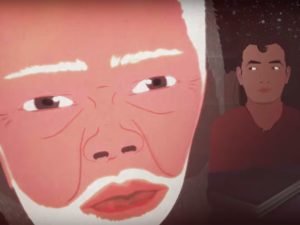
Last year’s acclaimed coming of age film, Call Me by Your Name, tells the story of a teenage boy named Elio who falls in love with an older man named Oliver. Elio and Oliver meet at a Villa in northern Italy and spend their time together eating, drinking, and dancing their nights away. Elio is free to come into his sexuality on his own terms, with a kind older lover and understanding parents. I find myself mesmerized by how sweet and intimate it all feels, but I also see Elio’s story as aspirational. For many in the LGBTQ community, Call Me by Your Name is about as far off from reality as a Disney fairy tale.
Arshad Khan’s documentary, Abu, tells a more relatable coming of age story, one where connections are nurtured, broken, and reconciled. Before moving to Canada from Pakistan, Khan’s father, the eponymous Abu, was a forward-thinking man. He was an entrepreneur with children who loved to dance the nights away to pop music. But Abu started changing after he arrived in Canada. He gradually shifted to conservative religious values and began enforcing them on his household. At the same time, young Arshad started experiencing his sexual awakening, suppressing his homosexuality at a time in life when we begin defining ourselves. Abu and Arshad’s opposing desires were a recipe for conflict that drove them apart.
Abu makes for a compelling watch because the story intersects with so many current issues. It’s a safe bet that you’ll find at least one topic that’s resonates. The film covers racism, homophobia, sexual assault, xenophobia, ageism, and racial profiling. While that may sound like a lot to chew on it really isn’t. It all comes down to feelings of exclusion and what it’s like when we’re treated as an “other.” That otherness can come from the police, an employer, or in the case of Arshad, his own family.
Arshad paints a vivid picture of how otherness affected his household. He doesn’t just describe otherness to us, he pulls from decades of old home video footage to walk us through a series of key moments. Arshad spends the most time discussing his eroding relationship with his father. Specifically, how otherness seeped into the Khan’s home and turned their relationships toxic.
Abu’s accolades from back home didn’t hold up in Canada and he was cast to the bottom tier of the workforce. His age, brown skin, and accent didn’t increase his odds of succeeding either. For Abu, religion was all that welcomed him with open arms. Religious conservatism gave him the sense of belonging he craved, even if it would cost him his gay son.
Otherness alienated both father and son but they handled it in different ways. Abu closed himself off and let dogmatic beliefs define him. Arshad spent years suppressing his authentic self. Abu coiled up whereas Arshad blossomed. For Arshad, repression was the crucible that forged the outspoken activist who exists today. Though young Arshad struggled, his film proves that we can rise, dust ourselves off, and come back stronger.
It’s clear while watching Abu that the film was lovingly crafted by a filmmaker at peace with baring his soul. Arshad delves into the darkest moments in his life to help guide others who are struggling with their own journeys. You can call his documentary insightful, courageous, and inspiring, but the title I find most fitting is relatable.
- Release Date: 4/13/2018


